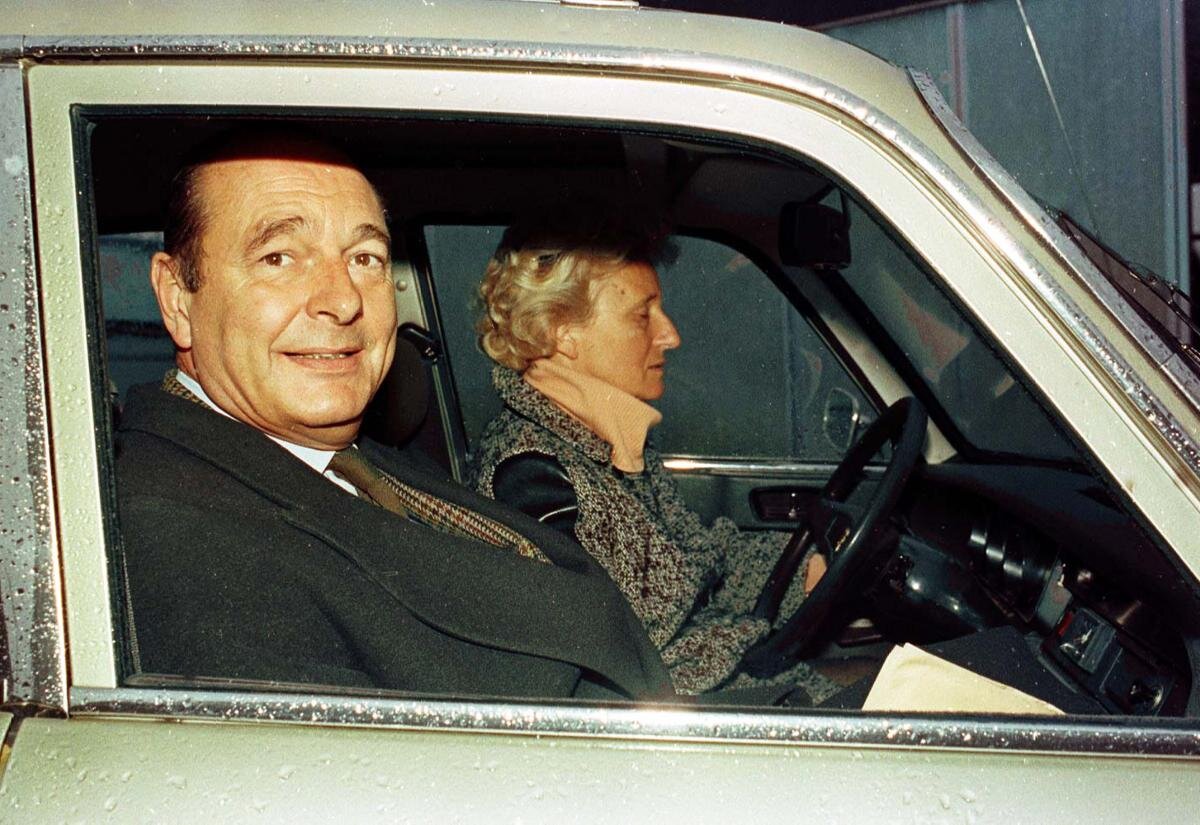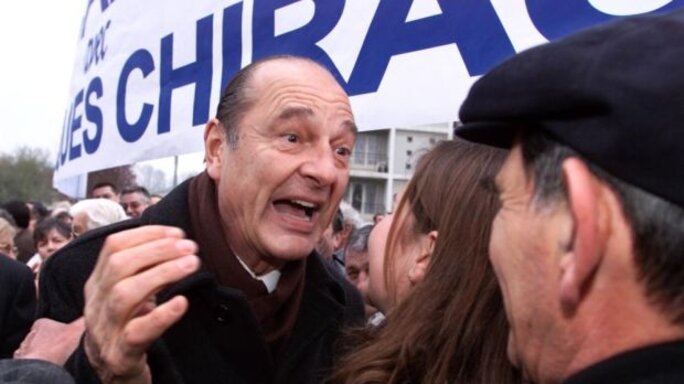Former French president Jacques Chirac, the Gaullist conservative who served two terms as head of state and twice as prime minister, who was for 18 years mayor of Paris and who had the ignominy of being the first former president to be convicted by a court, has died at the age of 86.
Chirac died “peacefully” at his home in Paris on Thursday morning while surrounded by his family, announced his son-in-law, Frédéric Salat-Baroux. Since a minor stroke in 2005 his health had steadily declined and from 2014 he no longer appeared in public as it worsened, when he became wheelchair-bound and senile. “Little by little dialogue has become impossible,” said Jean-Louis Debré, a friend and fellow conservative, speaking of Chirac’s condition in an interview earlier this year with French daily Le Monde.
In a political career spanning more than four decades, Chirac, who founded the Gaullist conservative RPR party in 1976 (later renamed the UMP, now Les Républicains) over which he presided until 1994, was driven by an ambition of unusual stamina, even among politicians, to gain, and hold on to, power, ruthlessly dividing and eliminating rivals. His election as president in 1995 came after he twice lost previous bids.
Born in Paris to middle-class parents and a graduate of the elite administration school ENA, Chirac’s political career began properly in 1965, when he was elected as a municipal councillor in the Corrèze département (county) in rural central France, which he subsequently made into his first fiefdom. After becoming an MP for the region in 1967, he was appointed junior minister for employment that same year, and steadily rose through government ranks to become interior minister in 1974, under then president Georges Pompidou. It was reportedly during this period that he gained the nickname that would later follow him – “le bulldozer”.

Enlargement : Illustration 1

He became mayor of Paris in 1977, making the city hall his second political fiefdom and which would be tainted by sleaze scandals, holding on to the post until his election as president in 1995.
His re-election in 2002 was in face of far-right Front National leader Jean-Marie Le Pen, who had reached the two-candidate play off final round after the electoral collapse of the Left, when Chirac’s landslide victory was the result of votes begrudgingly cast in his favour by his leftwing opponents in order to stop Le Pen reaching power.
For most of his career, Chirac was implicated to various degrees in numerous scandals, notably a corruption scam during his period as Paris mayor in which he arranged for his party’s staff to be secretly paid from City Hall funds. For that he faced trial in 2011, in absentia after a medical report concluded he had a “severe” and “irreversible” diminished cognitive state, and was convicted and handed a two-year suspended prison sentence. It was the first time a former French president had been convicted of a crime.
Despite his opportunism, the permanent clouds of scandal that hung above him and his underhand manoeuvres – which earned him the nickname “Superliar” on a long-running French TV satirical puppet show depicting him as a comic Superman – Chirac succeeded in crafting a public image as a likeable rogue, a down-to-earth man of the people, taking every opportunity to engage in baby-kissing and hand-shaking walkabouts, a man who chain-smoked, had a penchant for Corona beer, and who was something of a ladies’ man. Despite numerous accounts of his adultery, his marriage in 1956 to Bernadette (née Chodron de Courcel) remained intact for 63 years. She survives him.
After his political career ended in 2007, when he was succeeded as head of state by Nicolas Sarkozy, successive opinion polls confirmed his strong popularity remained, and even grew, among a section of the French public, as illustrated by a survey in 2015 which placed him as the “most likeable” former French president, well ahead of runners-up François Mitterrand and Charles de Gaulle.

Enlargement : Illustration 2

Reflecting this were the tributes paid to him after the announcement of his death on Thursday which included gushing comments from figures of both the mainstream Right and Left. “Jacques Chirac knew how to form a personal bond with the French people,” said former socialist President François Hollande, who also planted political roots in the Corrèze as an MP, and who had amicable relations with Chirac and his wife. “France was in his blood. He explored every corner, tasted every local delicacy.” President Macron declared: “We have lost a statesman who we loved as much as he loved us”.
“The history of France turns a page,” said radical-left leader Jean-Luc Mélenchon, adding: “He loved France more than others since, and for that part we are grateful to him.” Current Paris mayor Anne Hidalgo, a socialist, declared:“Paris is in mourning”.
But his self-styled popular image belied a learned interest in primitive arts and Japanese culture. In keeping with previous French presidents who left behind monuments built in homage to themselves, Chirac launched the project to build a Paris museum dedicated to primitive arts, opened in 2006 as the Quai Branly Museum and which now carries his name.
When president, Chirac reduced the presidential term of office from seven years to five, in line with that of parliamentary elections, which as a result ended the so-called political “co-habitation” where by a president and parliamentary majority, and thus the prime minister, were at political odds – like his own two-year premiership under the socialist president François Mitterrand, and, for different reasons, the premiership of socialist Lionel Jospin under Chirac’s first term.
Arguably his most profound act as president during his own 1995-2007 term was to officially recognise the responsibility of the French State in the Holocaust, ending an official taboo on the subject. During a commemoration in 1995 of the round-up of Jews in Paris during the WWII German occupation of France, he gave a speech in which he said: “Yes, the criminal madness of the occupant was, everyone knows, seconded by French people, seconded by the French State.”
On the world stage, Chirac is probably best known for his opposition to the US-led invasion of Iraq in 2003, and the resumption of French nuclear tests in the South Pacific immediately after becoming president in 1995 – which did not prevent former president François Holland from claiming on Thursday that Chirac “understood before many others what’s at stake with global warming”. He was also a champion of the European Union, and promoted close ties between France and Germany. Germany's Chancellor Angela Merkel joined the tributes on Thursday, calling Chirac a “great partner and friend to us Germans”.
Meanwhile, former British prime minister Tony Blair, with whom Chirac had a tense relationship, notably over the war in Iraq, issued a statement saying: “He was a towering figure in French and European politics over many decades," adding: "Whatever our differences from time to time, he was always unfailingly kind, generous and personally supportive.”
But Chirac's presidency was marked by a failure to grapple with a growing social malaise in France, governing amid rising mass unemployment and a fractured society, illustrated by the violence of nationwide riots in poor suburban neighbourhoods that erupted in 2005.
His attempt to abruptly overhaul the French social security system in 1997, led by his prime minister Alain Juppé (his longstanding ally who was also convicted over the Paris city hall scam), ended in disaster in face of the huge trades union-led mobilisation against the reforms. Ensuing early parliamentary elections, called on Juppé’s misjudged advice, returned a socialist majority and government, led by prime minister Jospin, leaving Chirac politically emasculated and dealing with foreign policy alone.
Shortly before the 2002 presidential elections, Jospin, talking to reporters on a flight back to France from a visit to La Réunion island, described Chirac, then aged 69, as “tired” and “aged”. But it was Jospin who would be soundly defeated in the first round of the elections, and general elections immediately after Chirac was returned to power gave him a new conservative government.
Towards the end of that second term, already declining physically, notably following a stroke in 2005, and politically worn-out, his conservative rival Nicolas Sarkozy, more than 20 years his junior, positioned himself as their party’s candidate for the 2007 presidential elections. After Sarkozy's election, Chirac's political career was definitively ended, and became forever tainted by his conviction for corruption in 2011.
-------------------------
- An in-depth review of Jacques Chirac's political career will be published on Mediapart's English-language pages on Friday.


